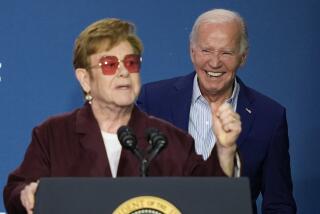Sexuality Is Not Just ‘Gay’ or ‘Straight’ : Gay rights: A movement that identifies a person by sexual behavior is limiting, not liberating.
- Share via
When we look at the gay political movement, we see 25 years since the Stonewall riots focused on promoting gay identity. This agenda has focused on “coming out,” asking people to publicly identify themselves as homosexuals. It is an agenda aimed not at sexual freedom but defining homosexuals as a minority of persons to be protected against discrimination as defined in statutes. It attempts to cast what is essentially a moral issue as a civil-rights issue. But does this effort succeed?
The identity agenda is based on three assumptions:
* Coming out is the best way to integrate one’s sexual experience into one’s life and personality.
* Coming out reduces the social stereotypes and fear of homosexuality.
* Coming out has resulted in political changes promoting greater acceptance of homosexual behaviors.
None of these assumptions, however, is true. Many studies have indicated that coming out entails the adoption of the stigmatic role that society has created in order to isolate and confine a certain behavior to a distinct population. Like other stigmatic roles, it attributes the behavior to an internal condition (sometimes called “sexual orientation”) that distinguishes some people from others.
Instead of helping stigmatized persons integrate their sexual behavior into a moral system of behaviors, gay identity does just the opposite, removing it from the realm of freedom and responsibility. It objectifies the behavior, making it a “thing” with a life of its own that tends to organize more and more of one’s personality and life around sexual behavior.
The identity agenda also assumes that coming out reduces the fear of homosexual behaviors. Sociologists point out that intimacy is rarely the solution to oppression and give the case of women’s intimacy with men as proof. Coming out only brings home the lesson of stigma that no one is “safe,” making others even more guarded of their own gay feelings.
Science has repeatedly confirmed that homosexual experiences are not confined to any psychological or physical type of person. Gay identity results not from an internal condition but from adopting a role that society has constructed for the purposes of controlling, isolating and confining gay behaviors. Authorities such as Sigmund Freud, pioneering sex researcher Alfred C. Kinsey and John DeCecco, editor of the Journal of Homosexuality, have expressed the belief that everyone is born potentially bisexual and that one’s sexual capacities and choices are influenced by a wide combination of social and personal factors.
Aristotle long ago condemned our human tendency to define people by their behavior, an error of logic he called “hypostasis.” English philosopher John Stuart Mill wrote, “Of all vulgar modes of escaping from considerations of the effect of social and moral influence on the human mind, the most vulgar is that of attributing the diversities of conduct and character to inherent natural differences.”
Gay identity is the result of our society’s intense and long-standing persecution of homosexual behaviors. As Kinsey pointed out in 1948, “There are practically no European groups, unless it be in England, and few if any other cultures elsewhere in the world which have become as disturbed over male homosexuality as we have here in the United States.”
This disturbance has produced a vicious and lazy way of thinking that divides the whole world into two kinds of persons, gay and straight. Labeling people as gay and straight is a no-win agenda that only reinforces the stigma, because it is a function of the stigma.
Jim Fouratt of New York, one of the leaders of the gay liberation movement that arose from the Stonewall riots in 1969, wrote: “ Homosexual. I find the word hard to relate to because it puts me in a category which limits my potential. It also prescribes a whole system of behavior to which I’m supposed to conform which has nothing to do with the reality of my day to day living. . . . I reject the word homosexual. I reject a category that defines my central life thrust in limiting terms. I am a human being.”


